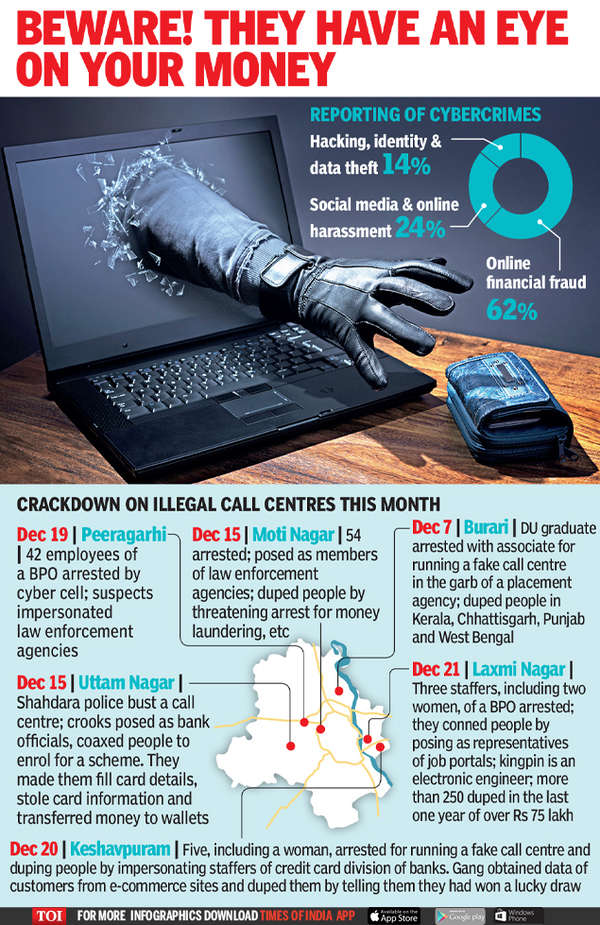- News
- City News
- delhi News
- Call of swanky lifestyle behind fraud BPOs
Trending
This story is from December 25, 2020
Call of swanky lifestyle behind fraud BPOs
Around a decade ago, 33-year-old Amit Kumar graduated in electronics from a prestigious engineering college in Greater Noida and had a fairly successful career while working with various companies, including IT outsourced firms. However, his life changed in 2018 when he met some scamsters at a party. Kumar then became a part of the illegal call centres that had mushroomed in and around Delhi.

Representative image
NEW DELHI: Around a decade ago, 33-year-old Amit Kumar graduated in electronics from a prestigious engineering college in Greater Noida and had a fairly successful career while working with various companies, including IT outsourced firms. However, his life changed in 2018 when he met some scamsters at a party. Kumar then became a part of the illegal call centres that had mushroomed in and around Delhi.
Now arrested, Kumar is among scores of youths and middle-aged men caught in the web of illegal BPOs, which from the outside seemed to have a perfect corporate setup with hiring of staffers at a swanky office and the latest computers.


Posing as US Marshals Service and Drug Enforcement Administration sleuths, hundreds of youths donned different roles each night and siphoned off crores.
A recent crackdown ordered by Delhi Police commissioner SN Shrivastava exposed the huge scale of these operations as over half a dozen illegal call centres were busted this month itself.
In November, the Cyber Cell arrested 17 people from a fake call centre in west Delhi’s Rajouri Garden that was duping foreign nationals by impersonating Microsoft tech support personnel. It is estimated that the gang duped 2,268 people between October 2019 and November 2020 of USD 1,081,365 (around Rs 8 crore). The main accused, Sahil Dilavari, a graduate, had been operating for the past three years.
Last week, another call centre in Peeragarhi was raided and 42 employees impersonating law enforcement agencies to cheat unsuspecting people abroad by threatening them with legal action were arrested. The call centre had a huge infrastructure setup and 90 computers and devices were seized, apart from Rs 4.5 lakh in cash that was to be paid to the callers as salary and holiday bonus for Christmas and New Year. The callers had extorted around Rs 70 crore from 3,500 people in the past one year.
The call centre busted in Laxmi Nagar had duped over 250 people of more than Rs 75 lakh. In Keshav Puram, the fraudsters had amassed over Rs 27 lakh in just one month.
The Cyber Cell found that most people involved in the racket were graduates belonging to middle-class families lured into crime for easy money. “The mastermind was usually a person who had started his career as a caller for a genuine BPO. To make easy money, he/she started the fake call centre. The data and contact details of prospective victims could be readily bought online or on the DarkNet,” said a senior officer.
“While the callers were youths aged 18-22 who could speak fluent English, the managers had proven skills to make a good ‘sales pitch’. The suspects had a strong liking for a good lifestyle, especially high-end cars,” the officer added.
Investigation revealed that each caller was paid a minimum of Rs 20,000-25,000 as monthly salary, while the team leaders and closers/managers were paid Rs 45,000-50,000. The salary of the shift manager was around Rs 75,000 per month. In addition to this, all employees were paid incentives. For every dollar scammed, the caller got Rs 2 and the team leader/closer Rs 4 as incentive.
Now arrested, Kumar is among scores of youths and middle-aged men caught in the web of illegal BPOs, which from the outside seemed to have a perfect corporate setup with hiring of staffers at a swanky office and the latest computers.


It’s only what went on behind the scenes that was disturbing. From duping job aspirants, to a bank staffer in Seattle and a school teacher in New Jersey approaching retirement, these young men, who could speak English fluently, gave a whole new meaning to the booming BPO industry that had kicked off two decades ago in Gurugram.
Posing as US Marshals Service and Drug Enforcement Administration sleuths, hundreds of youths donned different roles each night and siphoned off crores.
A recent crackdown ordered by Delhi Police commissioner SN Shrivastava exposed the huge scale of these operations as over half a dozen illegal call centres were busted this month itself.
In November, the Cyber Cell arrested 17 people from a fake call centre in west Delhi’s Rajouri Garden that was duping foreign nationals by impersonating Microsoft tech support personnel. It is estimated that the gang duped 2,268 people between October 2019 and November 2020 of USD 1,081,365 (around Rs 8 crore). The main accused, Sahil Dilavari, a graduate, had been operating for the past three years.
Last week, another call centre in Peeragarhi was raided and 42 employees impersonating law enforcement agencies to cheat unsuspecting people abroad by threatening them with legal action were arrested. The call centre had a huge infrastructure setup and 90 computers and devices were seized, apart from Rs 4.5 lakh in cash that was to be paid to the callers as salary and holiday bonus for Christmas and New Year. The callers had extorted around Rs 70 crore from 3,500 people in the past one year.
The call centre busted in Laxmi Nagar had duped over 250 people of more than Rs 75 lakh. In Keshav Puram, the fraudsters had amassed over Rs 27 lakh in just one month.
The Cyber Cell found that most people involved in the racket were graduates belonging to middle-class families lured into crime for easy money. “The mastermind was usually a person who had started his career as a caller for a genuine BPO. To make easy money, he/she started the fake call centre. The data and contact details of prospective victims could be readily bought online or on the DarkNet,” said a senior officer.
“While the callers were youths aged 18-22 who could speak fluent English, the managers had proven skills to make a good ‘sales pitch’. The suspects had a strong liking for a good lifestyle, especially high-end cars,” the officer added.
Investigation revealed that each caller was paid a minimum of Rs 20,000-25,000 as monthly salary, while the team leaders and closers/managers were paid Rs 45,000-50,000. The salary of the shift manager was around Rs 75,000 per month. In addition to this, all employees were paid incentives. For every dollar scammed, the caller got Rs 2 and the team leader/closer Rs 4 as incentive.
End of Article
FOLLOW US ON SOCIAL MEDIA










